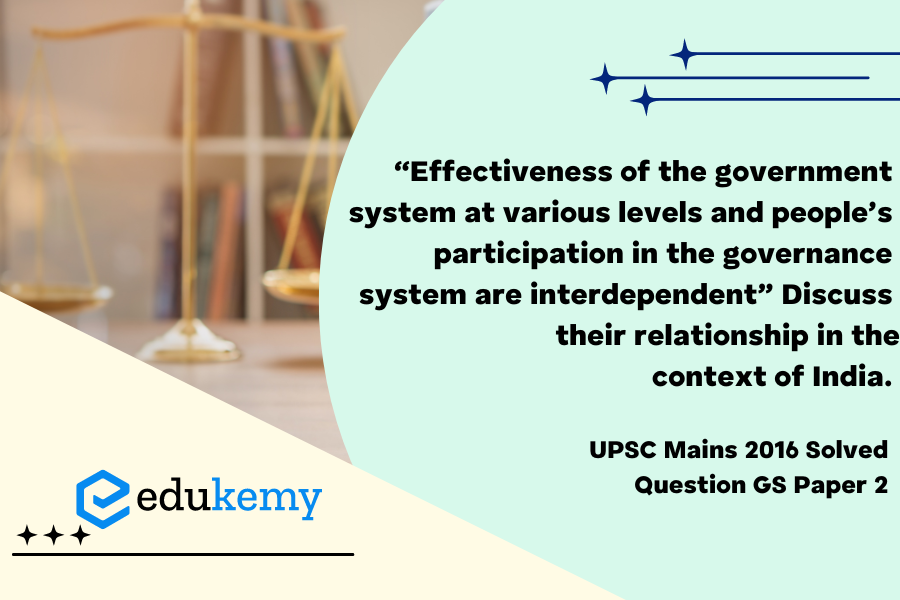In the intricate tapestry of governance, the effectiveness of a government system and the active participation of the people are symbiotically linked, forming the bedrock of a thriving democratic society. This relationship is particularly nuanced in the context of India, a diverse and populous nation with a federal structure. At various levels of government, from the local panchayats to the central administration, the efficacy of the system hinges on the degree of public engagement. In India, where democracy is not merely a political mechanism but a way of life, the government’s effectiveness is contingent upon the active involvement of its citizens. People’s participation is not confined to the exercise of voting rights during elections; it extends to grassroots activism, community initiatives, and collaborative decision-making processes. Conversely, the responsiveness and accountability of the government directly impact the level of citizen engagement. Effective governance fosters trust, encourages civic participation, and ensures that policies resonate with the diverse needs of the population. This interdependence is crucial in navigating the multifaceted challenges faced by the country, from socio-economic disparities to environmental sustainability. In essence, the synergy between the government and the people in India is pivotal for the success of the democratic experiment and the realization of inclusive and equitable development.
Tag: Important aspects of governance, transparency, and accountability, e-governance applications, models, successes, limitations, and potential; citizens charters, transparency & accountability, and institutional and other measures.
Contents
Decoding the Question:
- In Introduction, start by writing about effective governance and people’s participation.
- In Body, discuss how and why people’s participation in the governance system is essential.
- In Conclusion, try to mention recent government plans to enhance people’s participation in governance.
Answer:
Governance is the process by which a society manages itself through the mechanism of the state. There are many components that are involved in development like money, material, resources, technology, humans, etc., of all the social factors; human capital is a very crucial element. People are the pivot around whom the entire development process is supposed to revolve. One of the components of good governance as stated by UNDP is participation of citizens in decision making. It is important to view them as active participants in governance since they have a legitimate role in influencing decision making processes that affect their lives, businesses and communities.

Relationship Between Participation of People and Effectiveness of the Governance:
- In a democratic system, citizen participation is one of the key components of the decision-making process.
- Participation as a goal of a policy initiative entails empowering people in terms of acquiring skills, knowledge, and experience to take greater responsibility for their development.
- People’s participation can make the development strategy more effective by granting a say in dividing the objectives and strategies, and participation in management ensures effective utilization of resources.
- People’s participation in the decision-making process widens the coverage among all sections, including deprived and weaker sections.
- The involvement of people in governing the scheme creates local capability and ownership of resources. It is a sustainable development alternative for long-term solutions to local problems.
- People can effectively identify their own needs and share in the design, implementation, and evaluation of the participatory action; it helps in ensuring effective governance.
In India, this is facilitated at multiple levels through different mechanisms:
- Empowering citizens for their interaction with the government by making information available through RTI.
- Listening to the voices of citizens and their suggestions through public hearings, writing to various Parliamentary Committees and commissions when policies are put in the public domain, surveys, etc.
- Holding service providers and government agencies accountable through mechanisms like social audits.
- Demanding better services through Citizen Charters (CC).
- Participating actively in administration and decision-making through panchayati raj institutions and urban local bodies mandated by the 73rd and 74th Constitutional Amendment Acts.
In a democratic republican country like India, all political power in democracy stems from the people and is empowered by the people. The importance of people’s role in the overall development framework was well enshrined in the Indian Constitution in Article 40 (DPSP). The Government of India has taken various steps like RTI, MyGov app, social audit, etc., to ensure active participation of people for effective governance.
In case you still have your doubts, contact us on 9811333901.
For UPSC Prelims Resources, Click here
For Daily Updates and Study Material:
Join our Telegram Channel – Edukemy for IAS
- 1. Learn through Videos – here
- 2. Be Exam Ready by Practicing Daily MCQs – here
- 3. Daily Newsletter – Get all your Current Affairs Covered – here
- 4. Mains Answer Writing Practice – here


